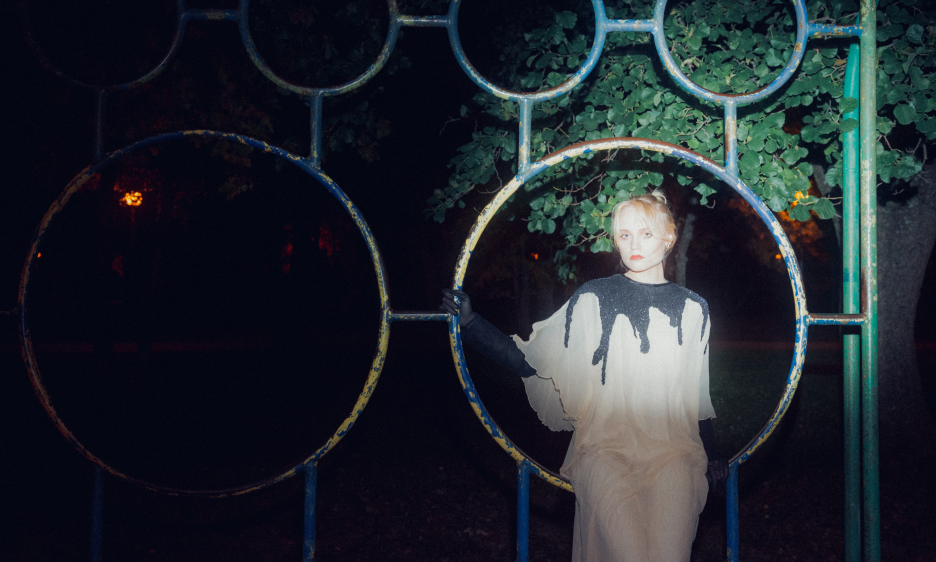Home » Jazz Articles » Catching Up With » Anett Tamm: a unique voice from the Baltics
Anett Tamm: a unique voice from the Baltics

Courtesy Markus Muide
I love to have outlets for all the different creative sides of myself.
—Anett Tamm
Born in 1997 and growing up in Estonia, with its rich history in the power of the human voice (the mass protest in the late 1980s against Russian occupation was largely galvanized by mass singing events), proved the basis for Tamm's early musical experiences. When her parents moved to live in Heidelberg she had the chance to perform there with the children's choir of the local opera theater and on return to Tallin she was able to continue these initial experiences through lessons in classical piano and song. As any teenager with these skills at her disposal, she almost inevitably tried her hand at covers of topical songs like Alanis Morrisette's "Ironic" and Alicia Keys' "If I Ain't Got You." But it was time spent studying for a BA and MA in Music that gave her the chance to expand her references to include the classical jazz repertoire, and which soon led her to check out more experimental sounds.
In her home town of Tallin, the capital of Estonia, Tamm has been playing with some cutting edge fellow contemporaries in the bands TamTam and Alfa Collective (active 2017-2022), the former a bass and vocal duo, and the latter a more eclectic quintet with a handful of releases straddling art-pop terrain. In both line ups Tamm has been the singer as well as principle writer, and occasional keyboardist and guitarist, so maybe it was no surprise that when the chance came to spread her experience outside home circles she grabbed it with both hands, only to have it cut short by the pandemic. This was the "Ophelia Songbook" project, which still managed five live shows before lockdowns intervened, and where Tamm first worked with the David Chevallier from Nantes, France.
This is the ensemble which took to the road in mid November 2024, starting in France before launching a tour of 24 concerts around the Baltics and Finland. In this environment Tamm is limited to vocals with occasional guitar while the trio perform Chevalliers' varied compositions, which could be classified as art-jazz. Whatever box one puts Tamm's latest project with the trio into, the music on offer is a set of highly structured compositions and improvisations based around Chevallier's intricate acoustic and electric guitar. And Tamm is the mouthpiece for its theme "Borders," having written all the lyrics in both Estonian and English.
The initial Finnish concert of "Borders" took place in the Finnish capital, at the Vuotalo Cultural Centre. It was a concert in an outer suburb of Helsinki and attracted 25-30 fairly diverse punters for a program of guitar-led pieces, almost all songs and with Tamm's lyrics. The songs were mainly reflective, maybe introspective, with English titles including 'Escape,' 'Cage in my Mind' and 'Estranged.' Post-gig, All About Jazz caught up with Tamm to explore her musical background, her influences and her motivation to tackle a topic critically sensitive in her own country, a country that shares a 180-mile border with its unpredictable eastern neighbor—a border which is now closed.
All About Jazz: Have you completed some degree courses in music?
Anett Tamm: I hold a Bachelors (2021) and Masters (2023) degree in jazz and improvised music from the Estonian Academy of Music. I also completed an exchange semester at the Music Academy of Cologne during my masters studies, which I really enjoyed.
AAJ: When did you start your musical career?
AT: My first "paid gigs" were at age 9, when my family was living in Germany: I sang in Heidelberg Theater's children's choir and we played the children in Puccini's La Bohème. So this was my first experience seeing behind the scenes of the professional music world in 2006-2007.
As for my career, it is hard for me to define because I feel like I'm only getting started. My more intentional and active life as a performing musician began in 2018 when I released the first album with my very first band Alfa Collective, the album Canvas (2018, Self Produced) consisting of my original music. Although I have moved on from this kind of music and the band isn't active anymore, I'm glad I went through the experience of making and releasing this album. It was a huge step for me at the time and brought some fun opportunities, including my first international concerts in Greece and Croatia. From that point on, I have continued to form and lead different groups, take part in various collaborative projects and to dive into the depths of the art.
AAJ: Do you have any significant early experiences that have been critical in becoming a professional?
AT: Music has always been my main outlet and preferred way of expression. My parents did a very good job of creating a supportive environment for me growing up, where I was encouraged to explore and develop my music interests. All my hobbies consisted of musical activities—I sang in children's choirs, studied classical piano in music school, began solo singing lessons at the age of 11, taught myself to play the guitar at 12 and began writing my own songs shortly after that. Every chance to perform was used and it made me take music very seriously at quite a young age, yet it remained playful for me. My curiosity was always fueled and I understood that if I stayed committed, there was so much to experience and discover through and in music. This probably contributed to me pursuing a professional career later.
AAJ: What would you say are your specific musical influences?
AT: There are numerous influences across genres and I never want to jump off the train of new discoveries, but in terms of developing and searching for my own tools for expression, I see the influences split quite clearly into two categories: vocalists and songwriters. Joni Mitchell is possibly my number one influence both in terms of singing, songwriting, storytelling, guitar playing and expression.
Vocalists and improvisers who have influenced my practice include Scandinavians Sidsel Endresen, Anni Elif, Sofia Jernberg, Isabel Sörling, Jenny Hval and Björk, then the Irish singer Lauren Kinsella, and Norma Winstone. I also have a very soft spot for great songwriting and need to mention the influences of Nick Drake and Paul McCartney, as well as some contemporary songwriters David Longstreth. I am a huge fan of his band Dirty Projectors, Weyes Blood and an incredible Estonian songwriter Vaiko Eplik.
AAJ: Do you have any American influences in your style? Your singing reminded me of Carla Bley.
AT: Carla Bley has definitely been an inspiration for me and from American jazz or jazz-influenced musicians I've also formerly obsessed over Annette Peacock, Bill Frisell, Chick Corea, Esperanza Spalding, Ben Wendel, The Singers Unlimited. I've also been strongly influenced by American folk and rock from the '60s and '70s, all the classics: Crosby, Stills & Nash, Simon & Garfunkel, The Carpenters, Stevie Nicks etc. These influences are predominant in my most recent solo project, my folk-pop alter-ego Alonette which I launched in 2024.
AAJ: Estonia has had a long and complicated relationship with Russia. Do you have any Russian influences?
AT: I was born in free Estonia in 1997 so I must say I have a disconnection with the Soviet nostalgia sounds and the 'estrada music' (a term including mainstream contemporary 'stage music' -ed) of the pre-independence era, and it hasn't been an influence on my own music. Russian contemporary culture is something that probably most Estonians are not very acquainted with since the mid-'90s, when there was suddenly a chance and freedom to explore what was happening everywhere else in the world. However, of course I studied the big classical composers such as Tchaikovsky, Stravinsky, Mussorgsky during my classical training years, but as I am not engaged in classical music nowadays I am also not too aware of the influence they might have had on me, aside from general music knowledge.
AAJ: Are there any other aspects of your art that you would like to mention?
AT: At the moment, I have three active original music projects consisting of Estonian musicians, additional to the collaboration with David Chevallier's trio: Alonette, TamTam and Anemoon. I'm always very excited to work on whichever project and working on them enriches me in very different ways, allowing me to change formats and express thoughts sometimes through a more simple singer-songwriter style, sometimes through collective improvisation. I love to have outlets for all the different creative sides of myself. It also opens doors to work together with musicians across genres and helps build many deep connections through music—the most valuable thing to me.
In 2025, my bigger plans are to release the debut album of my folk-pop solo project Alonette, record and release some music with my new quartet Anemoon and hopefully record "Borders" with David Chevallier Trio and perform the program some more!
Tags
Interview
Anett Tamm
Anthony Shaw
Estonia
Joni Mitchell
Sidsel Endresen
Anni Elif
Sofia Jernberg
Isabel Sörling
Jenny Hval
Bjork
lauren kinsella
norma winstone
carla bley
Annette Peacock
Bill Frisell
Chick Corea
Esperanza Spalding
Ben Wendel
Stevie Nicks
PREVIOUS / NEXT
Support All About Jazz
 All About Jazz has been a pillar of jazz since 1995, championing it as an art form and, more importantly, supporting the musicians who make it. Our enduring commitment has made "AAJ" one of the most culturally important websites of its kind, read by hundreds of thousands of fans, musicians and industry figures every month.
All About Jazz has been a pillar of jazz since 1995, championing it as an art form and, more importantly, supporting the musicians who make it. Our enduring commitment has made "AAJ" one of the most culturally important websites of its kind, read by hundreds of thousands of fans, musicians and industry figures every month.
























